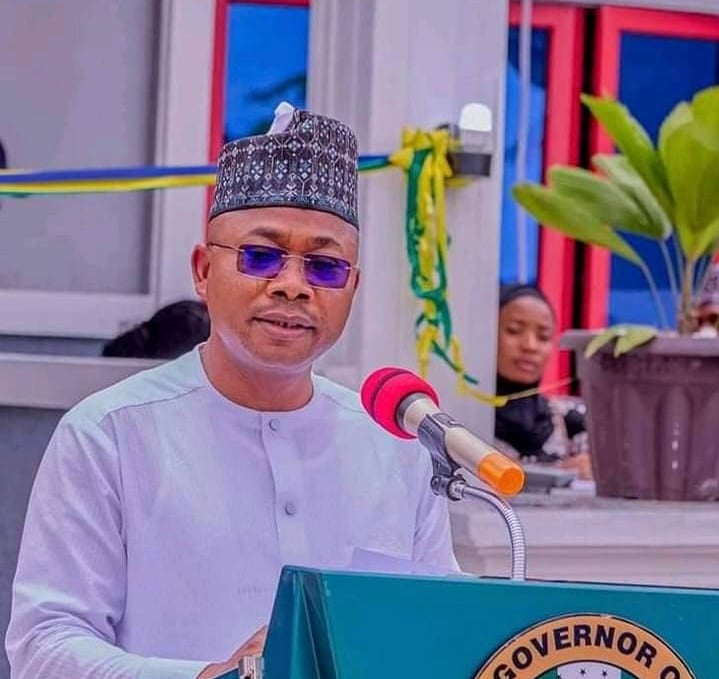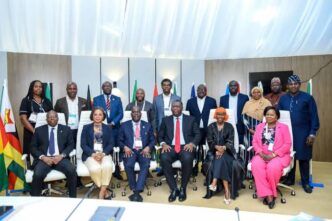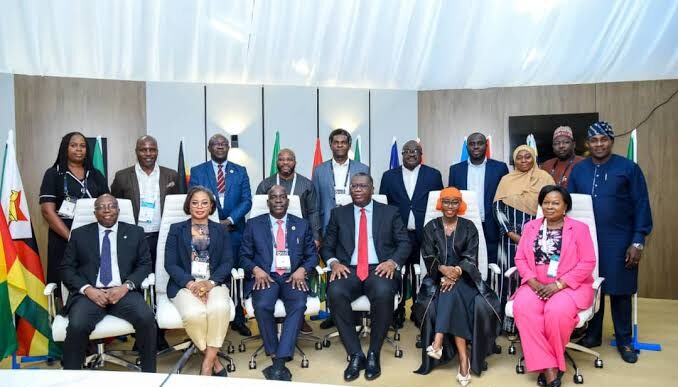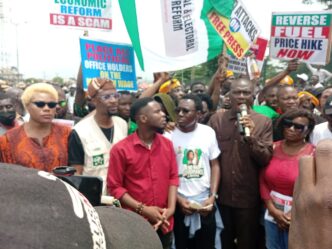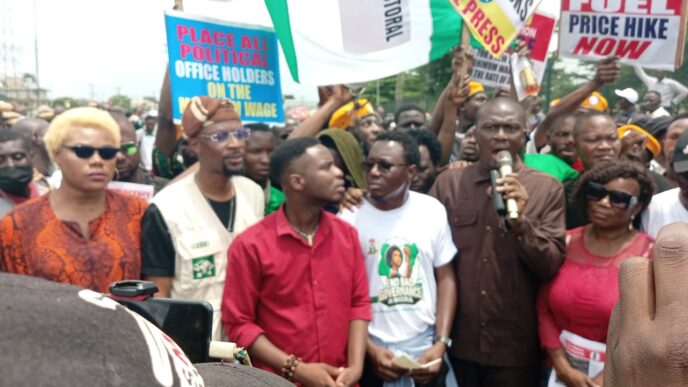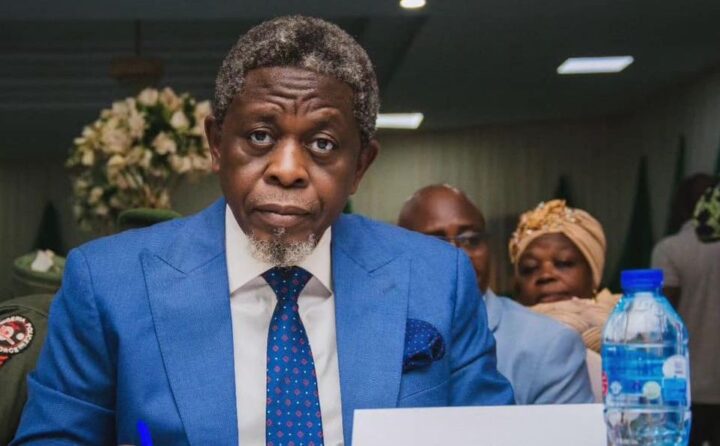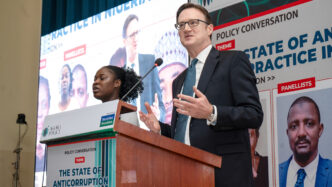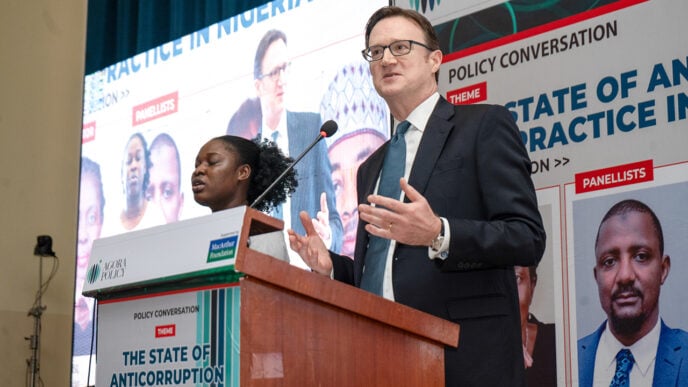Usman Ododo
“Development” is a term that does not lend itself to a simple and an easy definition, due to its robust characteristics. But socio-economically speaking, a sociologist views development to have taken place, if and when, there has been a significant reduction in the level of poverty (the inability to afford the basic necessities of life like, shelter, clothing, and feeding. Some scholars have argued that those necessities include healthcare services), social inequality, and unemployment. It may be a tad different, if viewed from the standpoints of other disciplines. But for the purpose of this piece, I am sticking with the sociological perspective.
Desirable as it is, development in reality, especially in this part of the universe, is, unfortunately, a very scarce commodity. This is not because we lack the required resources (human and material), but in most of the cases, it is as a result of lack of vision, and the political will to initiate and drive it. It could also be down to a misplacement of priority by political office holders. Execution of development projects is often subject to the fantasies of the political office holders, at every level. And they are often devoid of “bottom-top”, beneficiaries’ participation, approach, from the stage of formulation to that of implementation. The needs and preferences of the target beneficiaries are never factored in. Usually, some executors do not even plan it. No blueprint. So there is no guide on how to measure, acceptability, impact, performance and whether, it is being delivered in accordance with terms and specifications. These have been the challenges, every geopolitical entity in Nigeria has to contend with when we talk about development. Kogi State is not an exception.
Kogi is one of the nine States created in the twilight of General Ibrahim Badamasi Babangida’s (IBB) administration. It is one of the most endowed States in Nigeria, when we talk about mineral, and human resources. From iron ore, beryl, cassiterite, clay, coal, columbite, feldspar, fire clay, garnet, gold, granite, kaolin, magnetite, marble, mica, muscovite, silica sand, quartz, talc, tantalite to tourmaline, the Confluence State is the envy of some other States in the country. In terms of human resources, Kogi State has an embarrassment of talented and accomplished individuals across almost all human endeavours.
Talking about richness in cultural heritage, that serves tourists attractions, the State is high up there. Lokoja, its capital city, happens to be one of the three former capital cities of the geopolitical space called Nigeria today. It is also the city where two of the longest rivers in Africa (Niger and Benue) meet, which qualifies the State to be referred to as, “The Confluence State”.
Advertisement
All these, combined, fuelled the optimism of the founding fathers of the State, who pushed for its creation in 1991, believing in its economic viability, amidst the growing clamour for fiscal federalism and resource control in Nigeria. My late father used to tell me then, when the speculation was rife, on the creation of the State that Kogi has the potential of being among the richest States in Nigeria. This was shortly after, in 1989, the then Head of State, IBB had created Akwa-Ibom, and Katsina States. My father would say, “Kogi State is a possibility, when viability comes into consideration.” He explained further that, “the Ajaokuta Steel Company Limited (ASCL) is more than enough to set Nigeria on a well-paved path of accelerated industrial development, leading to socio-economic prosperity that would reverberate across Africa.” He concluded that, “being the host State of the magnificent steel plant, the creation of Kogi won’t be a misplaced priority, or a mere political experimentation by the then Head of State.” Remember, IBB then, was looking for every frivolity, to distract Nigerians from his set date of returning the country to civil rule. But State creation then was a welcome distraction if it ever was. My old man also spoke about limestone being another goldmine, that is deposited in abundance in the State. It is another of the potentials which has today, gone beyond mere academism, with the establishment of Dangote and Mangal Cement factories, at Obajana, and Iluagba-Gbede (a village near Ayetoro-Gbede in Ijumu local government area), respectively. So, besides the ASCL, there were several other firms that signposted the socio-economic potential of the young State, like the Jakura Marble Industry Limited (Lokoja), National Iron Ore Mining Corporation (Itakpe) Boja Industry limited, and Mopa Brewery Limited (both of Mopa), Oscar Steel Limited (Kabba), then with the about-to-be-established, Wellcrete Building Products Limited (Ayetoro-Gbede), which later did not see the light of the day, due to what is popularly referred to the “Nigerian factor.” That is a story for another day. These were in addition to other booming MSMEs across the State, that have now gone under, or at best, are operating, way below capacity.
Apart from POS, and Okada (commercial motorcycle) riding, I really do not know of any business, springing up in the State, over the last decade. Those who want to sound mischievous would say, “Kidnapping, armed robbery or political thuggery”, are the only booming industries in the State. But I won’t follow that route, even though it is about the truth.
Let us go, a bit, down the memory lane. Following the emergence of the first civilian Governor in the State — the late Prince Abubakar Audu, whose drive and passion for the transformation of the young State’s socio-economic potentials into a reality remain unmatched until date, the expectation skyrocketed in 1992. Although, some people in the State still have the feeling that, some of his development projects were skewed in favour of his Senatorial district (Kogi East), there are landmark achievements to point at, to his credit. For instance, the siting of the Kogi State University in Anyigbà. This, though, was in breach of his campaign promise, sometimes in early 1999 at the beginning of the 4th republic, that whether Kabba people (the Òkun-Yoruba) voted for him or not, the proposed State University would be sited in Kabba in line with the existing proposition by the Kwara State Government before the State’s creation, to site the institution in the capital of one of the oldest provinces in the northern Nigeria — Kabba. Upon his return to office in 1999, he did not only renege on the promise, but he also dismantled what was then known as “the Kogi State Specialist Hospital Kabba” (Kogi West), and that of Okene (Kogi Central), claiming that the State was not buoyant enough to operate them. Meanwhile, he was busy executing other capital intensive projects that were money-guzzling, with a particular focus on Kogi East. But beyond all the allegations of marginalising other parts of the State to the advantage of the part where he came from, late Audu laid the foundation for whatever could be pointed at today, as the structure for the socio-economic development of the State, which unfortunately, has hardly been built on.
Advertisement
The reins of his successors, from Ibrahim Idris, Idris Wada, to Yahaya Bello, were characterised by “arrested development”. One of them even spent 4 years planting flowers on the median of a major road that passes through the State capital, from Nmemme Bridge, before the Lokongoma Phase-2 Housing Estate, to Paperanda Square at the heart of the city, without being able to nurture the greenery to survival. It’s a simple, but monumental symbol of failure. This was shortly after a report was published, around 2009, rating the Kogi State Capital as the dirtiest of all the 36 capital cities in Nigeria. And interestingly, the succeeding administrations, including that of Audu, all have one thing in common: apart from uneven distribution of development projects across the State, and nepotistic appointments that celebrated mediocrity at the altar of unity, performance, and public service delivery, they all had allegations of corruption against their respective administrations.
As at today, that Kogi is one of the States with the poorest intra-state road networks in the country, despite the huge amounts that have been received in revenue allocation from FAAC, is an empirical fact. Forget about the optics you see on national television showing the flyover at Ganaja Junction, and other parts of the State capital. The sponsors of those behind the montage won’t take the cameras to other semi-urban, and rural settlements, which constitute over 95% of the State.
The immediate past administration hoodwinked the public with an “audio” Rice Farm and Processing Mill, christened “The Confluence Rice” in Omi near Ejiba in Yagba West Local Government Area. I learnt, it now exists barely in name, as all they, reportedly, do is to source for paddy from God-knows-where, for occasional processing and packaging for the camera. Nobody knows where the product — “Confluence Rice” is being sold.
For more than two decades, cumulatively speaking, I don’t think all of these administrations have been able to attract up to $5,000,000 (Five million dollars), worth of foreign direct investment (FDI) to the State, despite the abundant mineral resources deposits in the State. There was hardly any new business springing up, safe for Dangote Cement (which is a part of Governor Audu’s legacies), and perhaps, Mangal Cement. The only thriving industry in Kogi State over the last 8 years is the politically engineered insecurity, which was a decoy for siphoning the people’s commonwealth, and then use the loot to, water the seed of political thuggery through the creation of a phoney vigilante group for a thinly veiled purpose of entrenching a certain political hegemony. We all witnessed this in the launching of a political philosophy of “Taratatataaaaaaa….”, during the November 2019 gubernatorial election in the State, and the subsequent ones. To avoid distraction from the focus of this piece, I won’t go into details of how many lives were lost, as a result of that.
Advertisement
As though, that was not enough, civil servants had it the roughest in the hands of these administrations. During the immediate past administration, especially, they were subjected to receiving as paltry as 10% of their legitimate salary on a monthly basis, for a reason yet to be explained, as I pound my keypad. This was after they were made to undergo a never-ending screening exercise (HR audit) that lasted for years. At the end of the day, thousands of ghost workers and pensioners were purportedly uncovered, thus plugging one major points of revenue leakage. Meanwhile, it was a “scam” for which nobody in the State’s Ministry of Finance has been indicted or prosecuted, despite the trauma and stress the exercise subjected civil servants to. Some even lost their lives, either to road traffic accidents, or being killed by kidnappers. Pensioners too were not spared. I did a piece, around March 2022, when the matter got to its head, titled “Maximum minimum wage: Our presidential governor, and amputated workers’ salary in Kogi.” In the piece, I detailed the systemic robbery against civil servants, that allowed a secondary school principal to be paid a sum ₦9,000 — yes you read it right, nine thousand Naira as salary, while they’re not repaying any salary advance or any form of loan for that matter. Yet, there has been nobody to explain to them, the reason for the ridiculously low amount being paid as salaries across the different cadres of workers in the system.
As the State’s Auditor-General for Local Governments, for eight solid years, under the administration of his immediate predecessor, it is difficult, if not impossible, to divorce the incumbent Governor, Usman Ododo, from the consequences of actions or inaction of “the White Lion”, as Bello, his principal and political benefactor, is fondly called by his admirers. As a matter of fact, he was credited with the initiation and seamless implementation of the murderous amputated salary being paid to the workers, up to this moment in the State. It was, reportedly, his brainchild. I am still waiting to see how he wriggles his way out of that allegation.
However, all that almost paled into insignificance, the moment I stumbled on it in the news that, the Governor, “Usman Ododo is proposing a 32-year plan ‘to ensure sustainable development’ in Kogi.” To appreciate this, we need to understand what a development plan is. It is a document, a blueprint, which details the overall strategy of an administration for the proper planning and sustainable development of a nation. It generally consists of a written statement detailing the deliverables with allocated time frames. Furthermore, it is most often given a legal enablement, by ensuring that it is sent to the legislative arm of the government, for passage into law, to ensure a rigid adherence by successive administrations, with little modifications, where necessary — no deviation, no derailing. Likewise, it is the process of formulating strategies and policies to achieve socio-economic growth, in less developed areas of jurisdiction of the initiator, who could be a President, Governor, or a Local Government Chairman.
The non-existence of such an instrument of governance has been responsible for the lack of coherence in the directions in which each of those who have had the privilege of governing the State has taken it. Yahaya Bello, for instance, started with what he called “New Direction”, but ended up with a “No Direction” policy. Sloganeering is used in place of a craftily prepared medium or long-term development plans. In fairness to the “White Lion,” this “directionlessness” is not peculiar to his administration alone. His predecessor, Ibrahim Idris, and Idris Wada were equally culpable. All they seemed to think there is to governance is, receive FAAC allocation, and appropriate it in accordance with their whims and caprices. Fortunately for them, the legislature, in actual sense, is weak to the point of non-existence. So forget about oversight functions.
Advertisement
But with the proposed development plan, there would be a compass to work with. A comprehensive 32-year Development Plan, as being proposed by Governor Ododo, would give the state a semblance of purposeful governance, instead of “governance by sloganeering. That gladdens my heart, and I believe those of other right-thinking, and forward-looking Kogites.
Going forward, we’d know what to expect from each of the administration’s, with reference to the document. However, my main concern now is, what and what will be the contents of the plan? But, whatever they might be, we have started a journey — a journey towards the inculcation of a culture of governing with a plan; governing with a purpose; governing with a direction — sailing with a compass. It could be subjected to periodic review, meaning, the document could be fine-tuned, so that in can be in tandem with contemporary realities.
Advertisement
I therefore posit that, Governor Ododo should be encouraged in seeing through this fantastic initiative. He needs to be encouraged to reach out to as many as possible, intellectually inclined sons and daughters of Kogi State, who are passionate about the development of the State, for their robust inputs, so that the State could be pulled out of the current situation of “developmental cul-de-sac” into which the State had been driven by a confederacy of visionless, and greedy leaders, since it was created, about 33 years ago.
He needs to look beyond the cocoon of the confine of his ethno-religious group, and political associates, while scouting for the best brains to prepare the plan, especially now that the federal government appears ready to break the jinx of Ajaokuta Steel Plant, to make it operational. Furthermore, he must leave politics out of this, and reach out to those who have the intellect, the exposure, the clout (local and international) to attract the right development partners to the State.
Advertisement
Abubakar writes from Ilorin, Kwara state. He can be reached via 08051388285 or [email protected]
Advertisement
Views expressed by contributors are strictly personal and not of TheCable.

